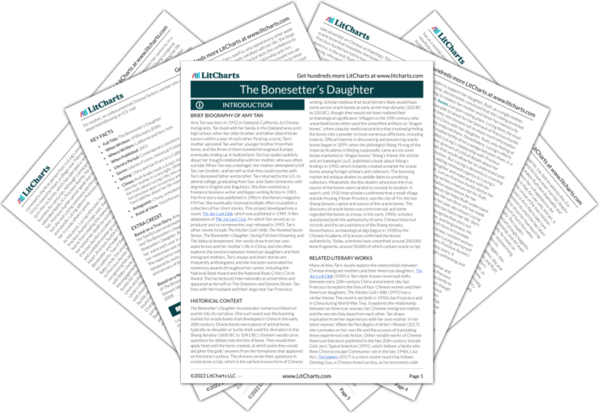The oracle bone symbolizes tradition, the past, and the power of storytelling. Oracle bones connect Precious Auntie to her family after her father, the famous Bonesetter, dies. When Precious Auntie becomes LuLing’s nursemaid, she loses her identity as the daughter of a revered, famous bonesetter and healer. Furthermore, because Precious Auntie cannot claim LuLing as her daughter, she is also unable to pass down her family lineage to LuLing, who is its rightful inheritor. Precious Auntie cannot explicitly pass down her father’s wisdom to LuLing, but she can give LuLing the oracle bone to symbolize LuLing’s rightful place among the family of bonesetters.
Oracle bones also symbolize the power of storytelling and writing to preserve tradition and immortalize memory. In ancient China, diviners would inscribe questions into the surface of oracle bones for the gods to answer. Because diviners often carved their questions into the bones with a sharp tool, the writing survived the ravages of time. The written language on the oracle bones shows how documenting history in writing can transmit messages across time and immortalize the past. After all, it is through writing that Precious Auntie shares her life story with LuLing—it’s also through writing that LuLing later passes down her life story to Ruth. The novel ends as Ruth sits in her office and prepares to begin her own written contribution toward documenting her family’s heritage.
However, bones also carry negative connotations. Precious Auntie believes the bones her family has removed from the Monkey’s Jaw cave belong to their ancestor, who has placed a curse on the family as revenge for disturbing his grave. After Precious Auntie’s suicide, Mother orders for the body to be thrown into the quarry behind the Liu compound. A central part of LuLing’s guilt over Precious Auntie’s death—and the reason Precious Auntie has cursed LuLing—is that she failed to retrieve the bones and honor Precious Auntie with a proper burial. So, while the oracle bone symbolizes the rich cultural lineage that Precious Auntie passes down to LuLing, bones in general also reflect how inherited curses, traumas, and anxieties from the past that can continue to haunt people.
Bones Quotes in The Bonesetter’s Daughter
“I hope you will still forgive me. Please know that my life has been miserable ever since you left me. That is why I ask you to take my life, but to spare my daughter if the curse cannot be changed. I know her recent accident was a warning.”
I searched for her until dusk. By then, my eyes were swollen with dust and tears. I never found her. And as I climbed back up, I was a girl who had lost part of herself in the End of the World.
She understood more clearly why her mother had always wanted to find Precious Auntie’s bones and bury them in the proper place. She wanted to walk through the End of the World and make amends. She wanted to tell her mother, “I’m sorry and I forgive you, too.”
Ruth began to cry. Her grandmother had a name. Gu Liu Xin. She had existed. She still existed. Precious Auntie belonged to a family. LuLing belonged to that same family, and Ruth belonged to them both. The family name had been there all along, like a bone stuck in the crevices of a gorge. LuLing had divined it while looking at an oracle in the museum. And the given name had flashed before her as well for the briefest of moments, a shooting star that entered the earth’s atmosphere, etching itself indelibly in Ruth’s mind.












